
“After lengthy consultations, the BMC National Council finally decided to back climbing becoming an Olympic sport at its meeting of 12 September 09.”
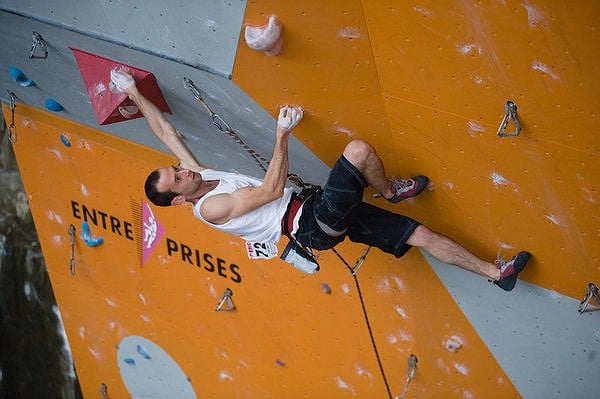
The competitive climbing scene has long cherished an Olympic dream - in fact, some participants have been cherishing it since the sport's inception, over 20 years ago. Now, at last, that dream is inching closer.
The International Sport Climbing Federation (IFSC), the organisation that oversees competition climbing globally, was provisionally 'recognised' by the International Olympic Committee in 2007. Supported by climbing federations across the globe, international competition climbing is now gearing up for the day when it's ready to apply for official Olympic worthiness.
Following consultation amongst the BMC Areas, the National Council agreed that the BMC would support the idea of climbing becoming an Olympic sport. This support will be based on competitions taking place on artificial structures only.
From humble gyms for rock-climbers to an aspirant competitive Olympic sport in its own right: the news highlights how far artificial climbing walls have traversed from their mountaineering roots. It also brings important questions under the striplights for all British climbers. The climbing teams representing Britain are woefully underfunded. Why?
What funds support these 'BMC British Climbing Teams' anyway – annual BMC subs? Will the BMC be supporting the Olympic bid financially? Would Olympic status mean Government funding for British Climbing Teams so that they can make more of a mark internationally?
According to climbing legend, the first proper climbing wall was built in Leeds Uni in 1964. Climber Mick Ward said: “One person came off that wall and did one famous route, after which we all thought 'F*ck! This is what you need to do to get good.'” For many, that's just what artificial walls remained – a training gym for the real thing – challenging yourself on rock.
For others though, 'getting good' on climbing walls held a stronger pull, as did competing against others, and the story was just beginning. Like some kind of unstoppable evolution, walls and holds developed under the fingertips of generations of these climbers. And now, 45 years after that Leeds wall was built, there are routes attainable only by those prepared to spend countless hours squinting at minute chunks of plastic bolted at improbable angles, and we have this almost unrecognisable offshoot of mountaineering - competition climbing - so firmly rooted as a sport in its own right that it's heading for the Olympics.
Rob Adie, Climbing Walls and Competition Officer for the BMC explains: “I think competition climbing would make an excellent Olympic sport. The question is just what form the Olympic sport would be and what aspects – lead, speed and/or bouldering?”
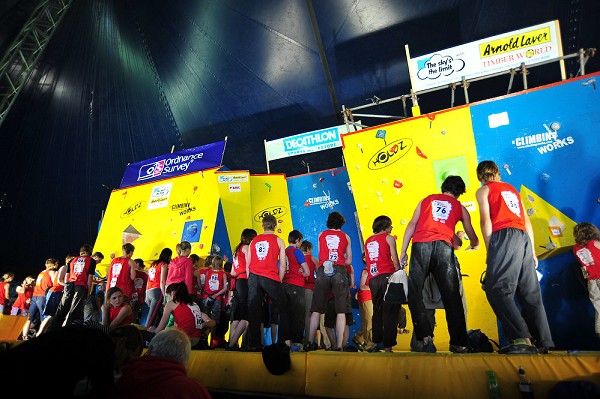
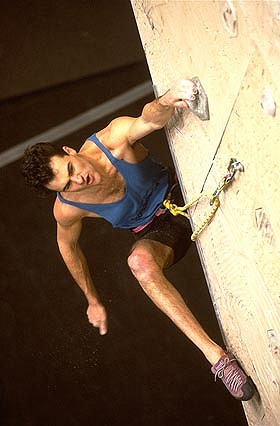
A short history of indoor competition climbing
In 1986, the French organised the first indoor competition near Lyon. The International Mountaineering and Climbing Federation (UIAA) recognised the indoor competition circuit in the late 1980s.
The first UIAA sanctioned World Cup series was in 1989 and the first event was run by the BMC in Leeds: our own Jerry Moffatt won it, and Simon Nadin was the first World Cup champion that year, having narrowly beaten Jerry over the whole series. In 1998 the new discipline of bouldering was officially introduced.
All was going well until 2006, when the UIAA decided to cease governance of sport climbing competitions. 48 federations then convened to create the International Federation of Sport Climbing (IFSC) and carried on governing sport climbing independently.
Who needs rocks? Does the future of the sport lie in artificial and competition climbing?
'After two centuries of mountaineering tradition, two decades of competition, there is now a new millennium to climb.
According to the IFSC, competition climbing satisfies the 'human desire for more commitment, excellence and challenge' by enabling participants to climb faster, higher and stronger, 'challenging gravity and themselves in safety' and leaving 'mother nature unspoiled' by eliminating environmental impact.
In Britain though, surely more 'commitment, excellence and challenge' means less (or no) bouldering mats underneath hard, committing and hardly-protectable outdoor routes, climbed onsight and ground up in poor British weather conditions. Not practising on a top-rope also handily eliminates most environmental impact, so everyone's a winner aren't they?
Mike Coxsey, father of Junior Climbing Team star Shauna Coxsey, thinks this kind of British trad-mentality is making Brits drag their rock shoes in the comp climbing revolution:
“You just have to look on UKClimbing.com. If there's a news item – the British Junior Team have done well in an international climbing competition, there are no replies posted. If someone writes in a forum 'I've just done this HVS' that gets loads of replies!”
However, thousands of UK climbers of all ages are drawn by the bright plastic of climbing competitions; numbers are rapidly increasing, and it's also become quite a popular spectator sport. Lots of British Team climbers also do amazing things outdoors on rock, proving the two sports can harmoniously co-exist. And, even if you have no interest in climbing competitions, you have to respect those who sweat, sacrifice and dedicate themselves to getting podium positions in the name of British climbing.


“Competitions just take over your life. Every waking minute is spent either training or feeling guilty about not training. Early mornings in the gym with afternoons and evenings at the wall. Double sessions - as much as I can take. On the rare occasions when my body won't let me get out of bed to train, it's reluctantly forgotten about until I've recovered enough to crack on."
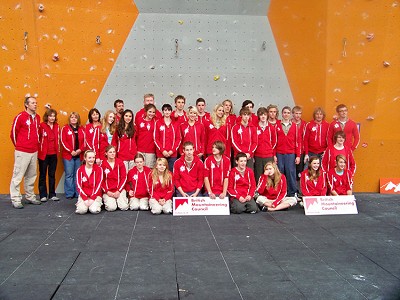
What's the point of comps? Opinions of the British climbing elite
World class professional British climber, Tyler Landman:
“The amount of training needed to do well at World Cups, to me isn't worth it. I'd rather push the levels outdoors. I climb to be outside and to challenge myself mostly. Being first in the world is not what I climb for.”
(“Although Tyler's background does include competitions, and when he was invited onto the British Team a few years ago the invite letter was framed on his kitchen wall,” says Graeme Alderson from Sheffield's Climbing Works)
Leah Crane from the British Bouldering Team:
“As well as climbing outdoors, I love competitions. They make you climb at your peak and make you think. It's all about your performance on the day: anything could go wrong, yet everything could go right. You have to be ready to perform on demand to your highest level ... or you lose!”
Shauna Coxsey from the British Junior Team:
“Climbing in the Olympics – I'd love to see the sport there, inspiring people and becoming more recognised.”
British Climbing Teams lack support
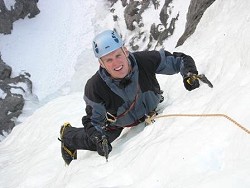
Over the last few months, Drew Haigh had planned to compete at Barcelona, Imst in Austria and Puurs in Belgium, and UKClimbing.com had commissioned him to write about each competition. However, recently UKC HQ learned it was all off: the flights, car hire and accommodation would cost him personally over £1,500 for those three competitions. Expenses from the BMC would total £90.
Why so little? - The BMC puts £15,000 a year into comp climbing. This is distributed to the British Climbing Teams by the team's size and success-rate: the Juniors and the Boulderers are enjoying a run of good form, so get the most funds. The money is then further divided to cover team training, comp licenses and travel expenses for the volunteers (who, for example, manage the Teams) ... the leftover pennies are divided amongst the actual competitors themselves. In short, there is no money available to send the British Lead champion to international competitions.
Mina Leslie-Wujastyk from the British Bouldering Team says: “I enjoy being on the British Bouldering Team and competing internationally. But because of lack of funding it is difficult to go to many competitions as we have to pay the expenses to get there. I think the British team could do really well in comps if, through funding, they were able to attend more.”
Graeme Alderson, one of the bods and brains behind Sheffield's Climbing Works, has worked in climbing walls and competitions since 1989 and is heavily involved with the IFSC. He thinks the BMC are “happy to leave it to others to move British competition climbing forward.” Is he right?

“We organise the Climbing Works International Festival (CWIF) because we want to give something back to the competition scene in the UK, and provide a challenge for the best climbers in the UK and also from abroad. CWIF 2009 cost us about £10k and we only got back £1k in sponsorship. Also feel free to add I regularly attend IFSC meetings at my own expense - the BMC only funds me to the IFSC Plenary Assembly.”
Rob Adie responds: “People tend to underestimate what the BMC does for competition climbing. Just one of the many things that spring to mind is running and organising competitions, which takes loads of staff time to administer in the office. All this time, much of it not immediately obvious or visible on the surface, has to be paid for. More often than not it's paid for by the BMC.”
Not always, though. Sheffield City Council has invested around £20k pa in the BMC British Bouldering Champs, held at Cliffhanger, over the last three years. A significant commitment, and next year Cliffhanger 2010 will host a round of the IFSC Bouldering World Cup.
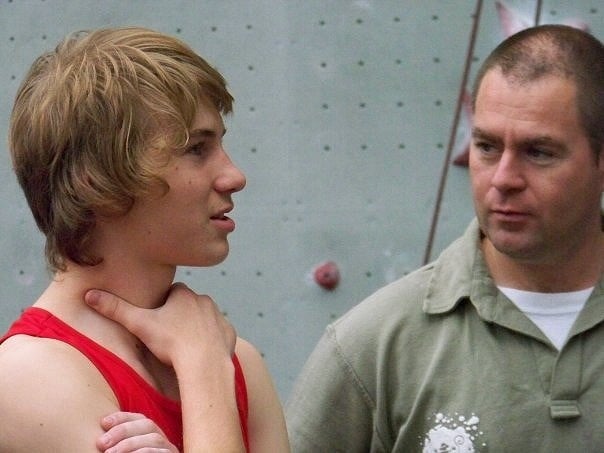
It's not often a British climbing team has been sponsored with hard cash as well as clothing and the Juniors are delighted:
“The Chunky Monki sponsorship allows us to be more professional. We have all received a generous amount of clothing and you can tell that we are a team at trainings and comps. The fact that Chunky Monki are promising money for photographs and publicity is extremely good! The funding for competitions in general is very poor. It becomes expensive when you are part of the team and you are travelling, competing and going to training events all over the UK and further.” says Shauna Coxsey (UKC News).
But as Dave Turnbull says later in this article, "comps need an extra £50+k/year to make a real difference."
Should the BMC do more to fund the British Climbing Teams?
The Mountaineering Council of Scotland and the Olympics
The MCofS published its Strategic Plan back in March 2009 after internal discussion and consideration from committees and particularly the MCofS Youth Working Group.
The plan supports the inclusion of climbing as an Olympic sport. It is the aim of the MCofS to see a Scottish climber on the podium of the first climbing Olympics!
We are also investigating representation on the IFSC. It is also our aim to see performance coaching for climbing established to support higher achievment.
Kevin Howett
Mountaineering Council of Scotland, Development Officer.
Graeme, Mina Leslie-Wujastyk and plenty of others speculate that now Audrey Seguy (MD of the Castle Climbing Wall in London and one of Britain's top competitive female climbers) is Vice President of the BMC, the BMC will become more involved in competitions.
Audrey Seguy responds: “As part of my job as Vice President of the BMC, I will be sitting on the climbing walls and competition committees and reporting back to the executive committee. I would certainly like to see more BMC involvement in Britain's competitive scene. Our national leading competition scene is shocking – less than 20 women enter competitions.”
Even if it becomes more emotionally and physically involved in comps, the BMC apparently can't flash more cash on them. There are two Government public bodies that distribute public money into UK sports: Sport England and UK Sport. Sport England money CAN'T be spent on elite athletes (their cash does go into BMC climbing comps though). UK Sport DO support elite athletes, but all their resources are channelled into Olympic sports ... climbing isn't an Olympic sport yet and isn't likely to be for many years yet.
So all the £15,000 that supports the British Climbing Teams currently comes directly from the BMC's membership subs and trading income (e.g. from selling insurance). But should the BMC be involved in climbing competitions at all?
Why isn't Government funding available for British Climbing Teams?

“We invest National Lottery and Exchequer funding in organisations and projects that will grow and sustain participation in grassroots sport and create opportunities for people to excel at their chosen sport.” www.sportengland.org
The Government public body, UK Sport, DOES support elite athletes. But it's focussing all its cash on Olympic Sports and climbing isn't one:
“UK Sport is accountable to Parliament through the Department for Culture, Media and Sport, and works in partnership with the home country sports councils and other agencies to lead sport in the UK to world-class success. UK Sport is responsible for managing and distributing public investment and is a statutory distributor of funds raised by the National Lottery.” www.uksport.gov.uk
Mike Coxsey thinks that, although they do a good job, the BMC is the wrong organisation to support climbing competitions, because its history and emphasis lies in mountaineering.
“There just isn't an infrastructure to support competitive climbers in UK so that they're good enough to win! The same countries win all the comps – France, Austria ...” Mike Coxsey
However there are very few climbing federations that deal solely with competition climbing, apart from (a few off the top of Graeme Alderson's head) USA Climbing, Österreichischer Wettkletterverband (Austria), FASI (Italy) and CFR (Russia). The French FFME is not a pure competition organisation and Slovenia – who are very successful in competitions – are an old school mountaineering federation.
Rob Adie responds: “The BMC are representative of ALL climbers, mountaineers and hill-walkers.”
He also explains that most European sport climbing federations are funded by their Government, other Governments aren't gearing up for hosting the next Olympics, and other countries place much more emphasis on competition climbing anyway, that's why the sport gets more funding everywhere except on our blighted island, where we already have to put up with worse weather than most of the rest of Europe, as if that wasn't enough reason for British climbers not to get out of bed in the mornings.
“The British Teams are in the unfortunate situation of having very little funding, no adequate training facilities and no decent weather to train outdoors that most of the Europeans have in spades. But at the same time, with all this adversity, we are still getting good results, particularly from the British Juniors and Boulderers.” Rob Adie
As for your BMC subs, they won't be spent on the Olympic push. Rob says chances are the IFSC will not need the BMC to do anything in the near future, so “there will be no financial implications at all, until the sport does go Olympic”. Then, the plan is to apply to UK Sport for funding for facilities, training, expertise et al.
“This money will filter down to grass roots level as well, and benefit the non-elite climber,” says Rob Adie.
So, once competition climbing goes Olympic, it will all be more merry and bright for British Climbing Teams, and indeed for the British climbing community as a whole. In the meantime, we'll just have to put on a stiff upper lip, have a cup of tea, suffer our adversities magnanimously, and have a look in the UKClimbing.com forums to see if anyone's commented on a good HVS recently.
A final word from Dave Turnbull, BMC CEO
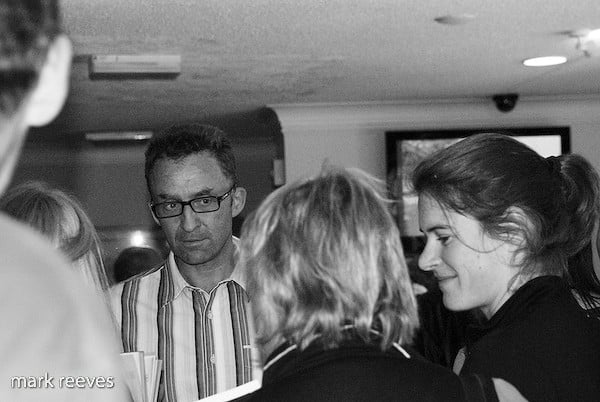
“At an international level the ball is now the IFSC's court to lobby for Olympic inclusion, while at a national level the BMC will be investigating what we can do to influence the process. The wider question of funding for competitions remains a difficult (and political) one for the BMC.
We used to receive £30k/year from UK Sport. In 2003 this was phased out as a result of changing priorities and - what it judged to be – the limited competition success of British climbers. The BMC then created a c£15k annual budget for competitions (from membership subscriptions and trading income). Last year our total spending on competitions, including staff time and overheads, was £71k (roughly £1.10/member). This year and next, the amount has been topped up by additional Sport England funding: £16.7k in 2009 and £20.6k in 2010.
Unfortunately this still won't be enough to do a proper job for competitions. The reality is that given the breadth of the BMC's activities and work programmes - access, conservation, safety, training, youth, climbing walls, crag ownership etc - and the demands on our resources it's unlikely that this deficit can be met internally. There might be a glimmer of hope for extending the current Sport England support for competitions but this is probably a long shot. The only other avenue would be to seek a commercial sponsor prepared to make a serious multi-year cash commitment to competitions and the British Teams.
No one's saying it's an easy task in the current financial climate – but if you've got any ideas or would like to offer support to the British Climbing Teams, please contact [email protected].”
Sarah Stirling is a freelance writer, public relations consultant and copywriter, specialising in outdoor sports, the natural world and travel.
You can find out more about Sarah at www.sarahstirling.com
- Therm-a-Rest Navis Sleeping Bag 7 Jul, 2013
- Scarpa Gea RS Ski Touring Boots 28 Apr, 2013
- Polvere Ski Mountaineering Skis 23 Apr, 2013
- Rab Infinity Down Jacket 7 Apr, 2013
- COMPARISON REVIEW: Mountain Hard Shells 4 Apr, 2013
- The Questionable Ethics Of Down Production 10 Jan, 2013
- WITH VIDEO: NEW TNF Summit Series Meru Range 12 Sep, 2012
- Autumn/Winter 2012 Polartec NeoShell Mountain Clothing 7 Sep, 2012
- The Trust: Ueli Steck and Scarpa Interview 21 Aug, 2012
- Patagonia Ultralight Down Jacket 5 Jul, 2012
















Comments